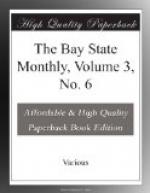The low rent and the industrious, frugal habits of Mr. Nurse and his family, added to the fact that not a dollar was required to be paid down at first, led to the making of such good improvements that before half the time had elapsed a value was created large enough to pay the whole four hundred pounds to Mr. Allen. When Mr. Nurse thus became owner of this estate he gave to his children, who had already good homes within its boundaries, the larger half of the farm, while he reserved for himself the homestead and the rest of the land. By the deeds he gave them, they were required to maintain a roadway to connect with the old homestead and with the homes of each other.
While the different members of the Nurse family were thus working hard for the money to buy the place there was hanging over its owner the shadow of litigation for its possession. But this was Mr. Allen’s affair, not theirs, so they went on their way in peace. Indeed, it has been thought that their steady success in life was one cause of their future trouble. They became objects of envy to those restless ones less favored. And so, when the opportunity came to merely whisper a name for the “afflicted girls” to take up, Rebecca Nurse’s fate was in the hands of an enemy. A striking example of the innocent suffering for the guilty. Does not vicarious suffering seem to be an important factor in the development of the race? Two years after, this faithful wife and mother had been led from her peaceful home to suffer the agonies of prisons, trials, and hanging. When the children had all married, the father gave up the homestead to his son Samuel, and divided his remaining property among his sons and daughters. He died soon after, in 1695. He was a kind, true father, whose requests after death were heeded. This homestead was in the Nurse name as late as 1784, when it was owned by a great-grandson of Rebecca. He sold it to Phineas Putnam, a descendant of old Nathaniel Putnam, who, in the hour of need, wrote the paper for the forty signatures above mentioned. The estate descended to the great-grandson of Phineas, Orin Putnam, who, in 1836, married the daughter of Allen Nurse. And thus a direct descendant of Rebecca Nurse was again placed to preside over the ancestral farm, and to their descendants it belongs to-day.




